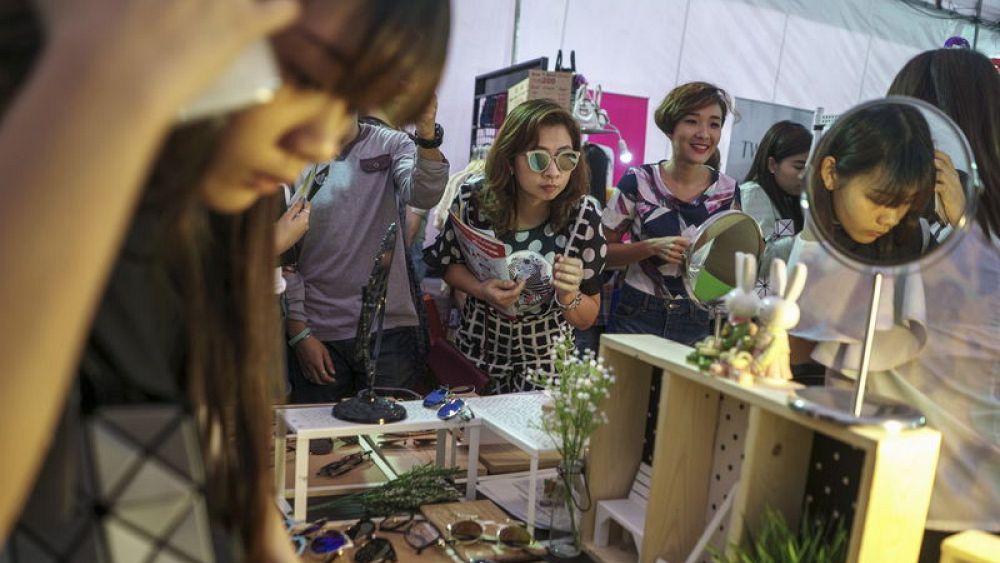
[ad_1]
By Chayut Setboonsarng
BANGKOK (Reuters) – Thailand’s new ultra-luxurious Iconsiam shopping complex opens its doors on Saturday, shrugging off a decline in tourist arrivals and political uncertainty ahead of next year’s elections.
“I wanted to build something that would tell the million stories of ‘Thainess’,” says Chadatip Chutrakul, chief executive of Siam Piwat, the firm behind Iconsiam, a half-million-square metre (sqm) complex sits on the banks of Bangkok’s Chao Praya River.
The retail sector is a rare bright spot in Thailand where the economy lags regional peers, even while growing at 4.6 percent.
Developers have $4 billion in retail investments in the pipeline, outstripping new projects in Jakarta, Singapore or Kuala Lumpur.
Retail sales growth reached a five-year high in August this year, up 17 percent from a year ago, much of it in malls.
This growth may be the dominant factor in Chadatip’s rock-solid confidence. Bangkok is expected to add more retail floor space than any city in Southeast Asia this year.
Siam Piwat’s malls at the centre of Bangkok’s shopping district were closed off at the height of civil unrest that ultimately led to Thailand’s 2014 military coup.
“There were mobs in front of our shopping centres…we closed for three months – I survived,” she said in an interview with Reuters. “We announced [Iconsiam] three weeks after the coup.”
New retail projects are being planned even as Thailand prepares for elections that senior government officials have said would likely be on Feb. 24.
The elections will pit supporters of the military and royalist establishment against populist political forces led by the Puea Thai Party that was ousted by the military in a 2014 coup.
Thailand’s political turmoil discouraged tourism growth, which also slowed after a boat accident killed dozens of Chinese tourists in July, but these concerns have not deterred developers. https://tmsnrt.rs/2PgR9wd
Siam Piwat’s Chadatip says she believes there are good opportunities in Thailand and tourism will recover.
MORE CLICKS WITH BRICKS
Even e-commerce in Thailand is turning to malls. JD.com-backed
SHOPPING BUT NOT SPENDING
But with mammoth retail developments going up and Thai household debt at 77.6 percent of GDP, some are questioning the sustainability of recreational shopping. “People like going to malls…but are they purchasing goods?” asks Adithep Vanabriksha, Chief Investment Officer at Aberdeen Asset Management (Thailand). Bangkok currently has 7.5 million sqm of retail space with another million in planned, nearly double what similar cities have lined up.
This breakneck expansion risks creating a supply glut such as seen in Kuala Lumpur and when foot traffic through malls doesn’t lead to sales, Thai retailers and developers are already working together to boost spending.
Pomelo is looking into partnerships with stores to tap into customer loyalty programs. There must be data-sharing on footfall and spending between landlords and tenants, which will require big investments in data analytics, says James Pitchon, Executive Director of real estate consulting firm CBRE in Bangkok, noting that “retail’s not dead, but it’s very complicated”.
CHANGING UP THE MIX
Another retail approach is to harness the convenience of the mixed-use project.
One Bangkok, a venture of Thai billionaire Charoen Sirivadhanabhakdi’s Fraser Property
Infrastructure investments and a government policy that draws in foreign investors will also benefit the project, which is expected to complete its first phase in 2022, Soon adds.
LA Staples-owner AEG and the Mall Group also announced $300 million in ventures including a 16,000 seat entertainment and retail complex.
The challenge to Thailand’s retail success is keeping shopping centre visits engaging and fresh, says CBRE’s Pitchon.”You need a reason to go…and it has to be a unique experience. Is it instagram-able?”
($1 = 32.8200 baht)
(Reporting by Chayut Setboonsarng, Additional reporting by Liz Lee in Kuala Lumpur and Aradhana Aravindan in Singapore)
Source link